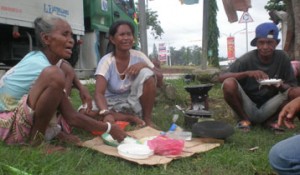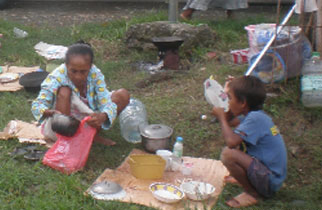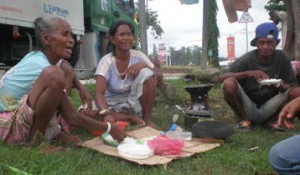By JOSEPH ARNEL DELIVERIO
Sibugay Express
 IPIL, Zamboanga Sibugay.—They fled Basilan to escape the menace of sea bandits, only to live more difficult lives here—as beggars.
IPIL, Zamboanga Sibugay.—They fled Basilan to escape the menace of sea bandits, only to live more difficult lives here—as beggars.
Seven impoverished Badjao families have made the streets of Ipil their home after fleeing Maluso town in Basilan to avoid what they said was harassment and terrorism by sea pirates and poachers.
They have been fending off hunger by begging alms from residents at the junction of the roads leading to Pagadian, Dipolog and Zamboanga cities.
Mendicant Badjaos have become a constant picture in the cities of Mindanao, but it is only now that they have reached such big numbers here in the southwestern side of the island.
 A nomadic tribe mostly found in the coastal areas of Zamboanga Peninsula, Basilan, Tawi-tawi and Sulu, Badjaos are known as sea gypsies who make their living as fishermen.
A nomadic tribe mostly found in the coastal areas of Zamboanga Peninsula, Basilan, Tawi-tawi and Sulu, Badjaos are known as sea gypsies who make their living as fishermen.
The Badjaos are also known to be gentle people who would rather leave a place than confront trouble, especially with anyone not belonging to their tribe.
In 2006, the Pontifical Council for the Pastoral Care of Migrants and Itinerant People listed the Badjaos as the poorest among the country’s nomadic tribes.
The council also said, “In the entire Philippines, there are no other people who are as collectively and individually poor as the Badjaos—without exception. Certainly none could be poorer.”
Badjao fisherman Ayde Nasayri said they left Basilan a month ago after his father and brother failed to return from fishing, and were presumed to have been killed by bandits.
“They take away your fishing boats; if you refuse, they will kill you,” he said in the Tausug dialect.
Nasayri said he was the last of his clan to flee Maluso and join his relatives in Ipil, bringing along his pregnant wife and children.
His relatives have been around Ipil for three weeks. They now number 25 individuals, most of them women and children.
The busy intersection is where they cook meals, sleep and engage in other activities a normal family would do, except that they don’t have walls and roofs over their heads.
They stay under a tree and a dilapidated billboard that shade them from the heat of the sun. At night, they sleep on cardboards on top of the cold pavement just outside closed business shops.
They take baths, do laundry and attend to personal necessities at the nearby Sanito River in the east side of town.
The seven families are all his extended kin, Nasayri said. They decided to flee Basilan for fear of the bandits but more so because they could no longer make a living out of fishing when bandits also took away their fishing boats, he added.
The families first fled to Zamboanga City but decided to proceed here when they could not get much help because people there do not give alms, Nasayri’s mother said. Zamboanga City has an anti-mendicancy ordinance.
The Badjao beggars, including their little children, go from store to store, person to person around Ipil’s business center and nearby residences, begging for money and food.
Asked where they would go in case local authorities drive them away, they said they would proceed to the fishing town of Labason, Zamboanga del Norte, where they hope they could go back to fishing.
Nasayri said he and his relatives got fed up with the bandits who have been constantly making trouble in the seas of Basilan. His pregnant wife almost got hit by bullets when the bandits attacked their homes, he added.
Nasari said they beg because it is the only way to survive.
“We don’t steal anyway,” he said, adding the assurance that they will not be in Ipil for long.
